Strikes In Iran Continue To Support Protest Movement
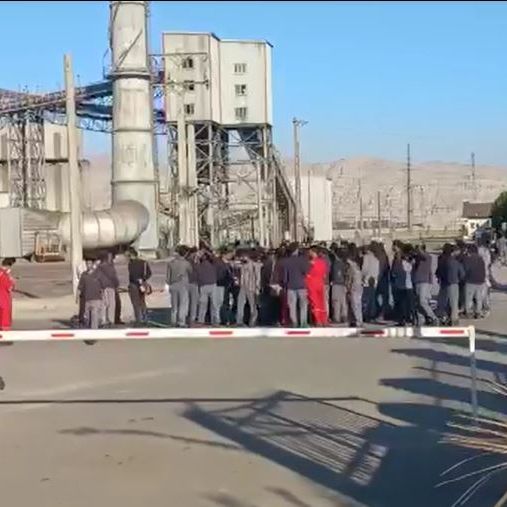
Iranian factory workers, truck drivers and nurses have continued the new wave of nationwide strikes as part of the antigovernment protest movement.

Iranian factory workers, truck drivers and nurses have continued the new wave of nationwide strikes as part of the antigovernment protest movement.
In the third month of the uprising against the Islamic Republic, a new round of strikes has begun in industrial, service, oil and gas sectors.
The organizers of protests said on social media that the workers at oil and gas sector have announced readiness to go on strike at different phases of Kangan and Asaluyeh fields in the Persian Gulf region.
Meanwhile, the employees of Madkoush Pelletizing Company in Bandar Abbas in southern Iran also held a gathering and stopped work to protest inattention to their demands.
Workers at Safe Khodro Car Manufacturing Company as well as drivers and truckers continued their strikes on Tuesday.
Reports from the cities of Shiraz, Esfahan, Sanandaj, Bandar Abbas, etc. show that the drivers are keeping up with their pledge to hold a ten-day strike to cripple the transportation system.
A video received by Iran International shows that a group of nurses at Imam Khomeini Hospital in Tehran stopped working and gathered chanting slogans to claim their rights.
In the meantime, the Oslo-based Human Rights Organization said the number of people killed during anti-government protests in Iran has risen to 448 including 60 children and 29 women.
“In the last week alone, more than 16 people were killed by repressive forces in Iran. Of those, 12 were killed in Kurdish areas,” noted the organization.
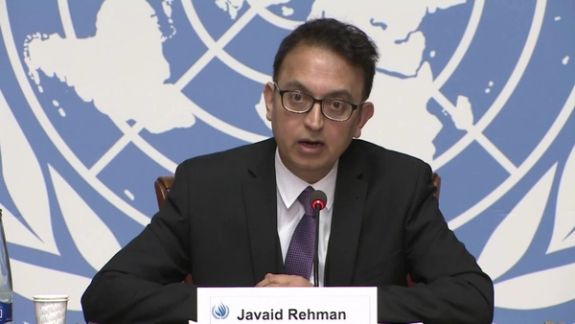
Javaid Rahman, the United Nations Special Rapporteur on human rights in Iran, has said a UN vote had increased the likelihood of “violence and repression.”
Rahman was speaking after the UN Human Rights Council voted November 24, by 25 votes to six with five abstentions, to establish a fact-finding investigation into deadly government violence against protesters.
In an interview with Reuters news agency, the special rapporteur, said he was concerned at a “campaign” of death sentences over recent protests in Iran, which has a high incidence of capital punishment: “I’m afraid that the Iranian regime will react violently to the Human Rights Council resolution and this may trigger more violence and repression on their part.”
According to Norway-based HRANA, November 286, 451 protestors and 60 members of the security forces have been killed in protests since September 17, the day after the killing in custody of Kurdish woman Mahsa Amini. Just over 18,000 people have been arrested. Rahman told Reuters that six of those arrested had this month been sentenced to death.
"Now (authorities) have started a campaign of sentencing (protesters) to death," he added, saying he expected more to be sentenced.
Already, 21 people arrested in the context of the protests face the death penalty, including a woman indicted on "vague and broadly formulated criminal offences", and six have been sentenced this month, Rehman said.
Budget, staff, evidence
The mission set up by the UN vote will have a $3.67 million budget and 15 staff, the news agency reported, but Rahman, who has not been allowed to visit Iran since he was appointed in 2018, did not explain what course of action he intended beyond an aim to “collect, consolidate and analyse evidence.”
Iran this week announced that it will not cooperate with the UN investigation, which means Rehman will continue to be persona non grata.
Rehman said he expected the mission to gather a list of perpetrators to be shared to national and regional legal authorities to “ensure accountability and…provide evidence to the courts and tribunals.”
The special rapporteur therefore appeared to evoke universal justice, under which states or international bodies pursue serious cases – usually crimes against humanity – regardless of where the alleged crime took place.
Universal jurisdiction
In July a court in Sweden sentenced to life imprisonment Hamid Nouri, a former Iranian official, over 1988 prison massacres in Iran, three years after he was arrested after arriving in Stockholm on holiday. In January a German court jailed for life Anwar Raslan, a former Syrian intelligence office earlier granted asylum, for murder and rape of prisoners in Damascus.
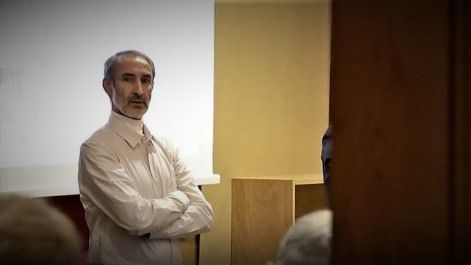
But such successes are rare. Notable failures in universal jurisdiction include Britain’s 1998 arrest under a Spanish warrant of former Chilean dictator Augustine Pinochet and the 2001-3 prosecution in Belgium of former Israeli premier Ariel Sharon over the 1982 massacres in Beirut’s Sabra-Shatila Palestinian camp. The US has generally eschewed universal jurisdiction, refusing to join the International Criminal Court. President Donald Trump in 2019 pardoned three US soldiers implicated in war crimes in Iraq, and President Joe Biden recently granted immunity to Mohammad bin Salman although US intelligence regards the Saudi crown prince as responsible for the 2018 murder of journalist Jamal Khashoggi in Istanbul.
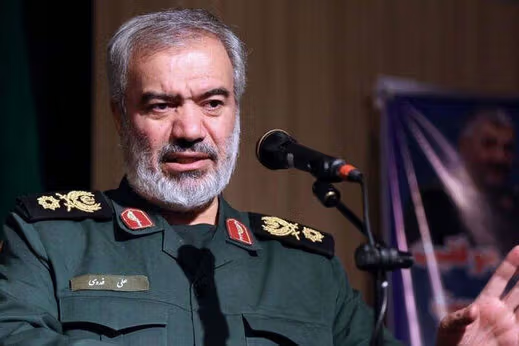
A top Revolutionary Guard commander claimed Tuesday that several people have been arrested during Iran’s “riots” were in touch with US intelligence agencies.
Iranian officials use term “riot” to describe the nationwide antigovernment protests.
Deputy commander of the IRGC Ali Fadavi said those arrested were not only in touch with “Iran International [TV], which is a branch of the enemy's spy services, but also were related to the intelligence and spy services of the United States.”
Iranian officials are frustrated that foreign-based satellite television such as Iran International and BBC Persian beam independent news and views on the ongoing protests. They have also virtually shut down access to the internet to restrict the flow of information.
He made the remarks on Tuesday during a meeting of IRGC commanders but did not provide any evidence to back up his claims.
Last week, Fadavi stated that anti-government unrest in Iran persists because there are protesters who have been “deceived”, presumably by foreigners.
“The IRGC tried to appease and put up with those who were deceived and joined the protests, and that is the reason why the unrest has not ended, otherwise it would not have lasted more than six days,” he had said.
“Deceived” is a term that Ali Khamenei, the Supreme Leader of the Islamic Republic, has used many times to describe the people, especially the young protestors in the streets, emphasizing that the unrest is staged by “foreign enemies.”
Other officials have been repeating Khamenei’s allegations that foreign countries and conspiracies were behind fomenting the protests.
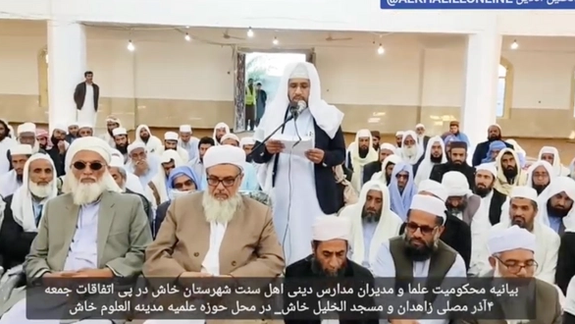
A group of Sunni religious leaders in several Baluch cities across Sistan-Baluchestan province called on the Islamic Republic to stop its repression machinery used against protesters.
In a joint video statement released on Monday, Friday prayer Imams and religious scholars from Khash, Taftan, Mijaveh and their neighboring towns decried the regime’s appalling attacks against the people of Kurdish majority cities, the killings on September 30 dubbed as ‘Bloody Friday’ in Zahedan, and a brutal crackdown of Khash residents on November 4, among others.
Protesting Islamic Republic’s violations of human rights and dignity, they said religious leaders, elders and intellectuals in the province with a unified voice condemn government’s violent reaction to protests across the country and show their “national solidarity.”
The clerics said the attacks against the people at the Grand Makki Mosque -- the largest Sunni mosque in Iran located in the center of Zahedan – and Al-Khalil Mosque in Khash, where security forces arrested many people, and similar incidents across the province are aimed at fomenting fear among the people to dissuade them from attending prayers at mosques. They denounced the strategy by the Islami Republic as “Mosquephobia,” apparently because the mosques are places where Sunni people gather to listen to their community leaders criticize the regime.
The signatories of the statement also called for "the release of all political prisoners in Iran, who were arrested during the recent protests." Noting that peaceful protest is the people's right, they also urged the authorities to address issues regarding women's rights. “The voices of the Iranian people should be heard," they added.
Emphasizing that the relentless ethnic and religious discrimination that has persisted over four decades of the Islamic Republic, the Sunni clerics expressed support for “the wise positions” of Mowlavi Abdolhamid as the serious and legitimate demands of the people.
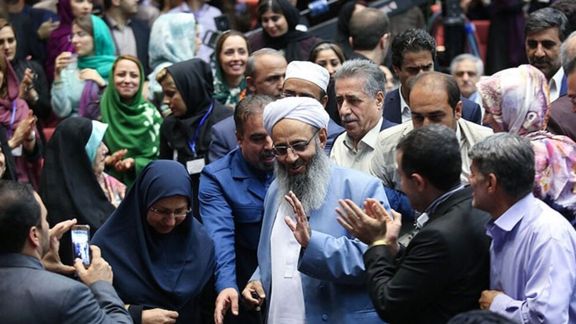
Molavi Abdolhamid, officially known as Sheikh Abdolhamdid Esmailzehi, is the most prominent religious leader of Iran's largely Sunni Baluch population living in the province. Abdolhamid's popularity is largely because of his willingness to challenge the absolute authority of Supreme Leader Ali Khamenei. Earlier in November, the outspoken Sunni Imam said women, ethnic and religious groups, and minorities have faced discrimination after the establishment of the Islamic Republic in 1979. He was also brave enough to blame Khamenei for the attack on protesters in his hometown, Zahedan, known as the Bloody Friday. It took place September 30, when security forces killed about 100 people, and injured hundreds. Earlier in the month, he called for an internationally monitored referendum, saying by killing and suppression the government cannot push back a nation.
The statement by the Sunni clergymen came a day after an audio file was leaked by the hacktivist group Black Reward, revealing the Islamic Republic’s plan to tarnish Abdolhamid’s reputation. The audio tape from a meeting between a Revolutionary Guard general and a group of media managers or representatives from outfits affiliated with the IRGC, revealed that Khamenei demanded Mowlavi Abdolhamid be warned over his comments. Qasem Qoreyshi, the deputy commander of IRGC’s paramilitary Basij forces, also said in the meeting that “We made a mistake about Abdolhamid. We first eliminated tribal leaders in the region to give more credit to Abdolhamid. However, he didn’t carry much weight [in the past].”
In a similar joint video statement released earlier in the month, Sunni religious leaders and Friday prayer Imams in Iran’s Kordestan province also called for a referendum under the supervision of international bodies. The Sunni clerics of Sanandaj and Dehgolan called for a plebiscite with the presence of religious and national leaders, as well as neutral international observers to “get out of the current situation.”
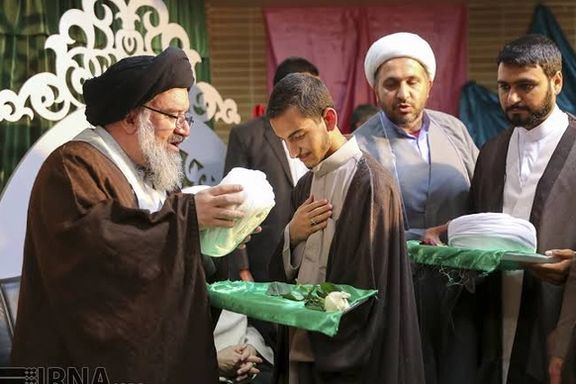
Mohammad Reza Moballeghi, an Iranian lawmaker, says some clerics no longer wear their robe and turban in public fearing disrespectful acts by random individuals.
Clerics in Iran are among the most privileged groups in society and benefit from many financial and other advantages although a majority of them have minimal educational and almost no work expertise. Among other things, they are exempted from the compulsory two-year military service and unlike other students who have to pay hefty tuition fees, clerical students in Iran get paid for studying in seminaries.
As Iran's biggest protests against the Islamic Republic and clerical rule has been raging on for more than 70 days, turban-tossing has become increasingly a way of taking on the clerics who are blamed for economic failures of the theocratic government and violations of human rights in Iran.
Turban-tossing has turned to s port for young people who approach a cleric in the street and fling the turban off his head. Influential clerics with links to the government rarely walk in the streets and are usually escorted by bodyguards.
Moballeghi, himself a cleric, speaking in parliament Monday said that "During the past two months the people's attitude toward clerics has changed for worse as there is a lot of propaganda against clerics."
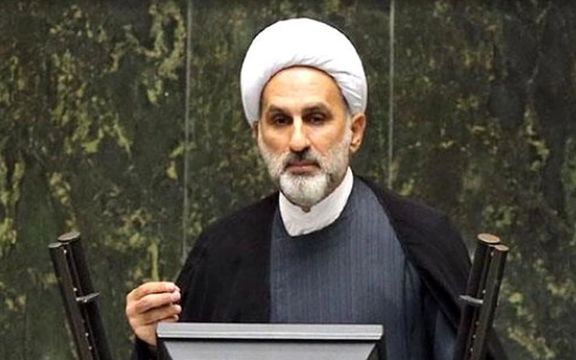
Fearing disrespect by the "new revolutionaries" in Iran, according to Moballeghi, many clerics prefer to appear in public in normal, secular outfit. Meanwhile, Moballegi claimed that the robe and turban that Iranian clerics put on follows the model of the outfit worn by Prophet Mohammad. Others, including some clerics say that the prophet dressed like everybody else. At the time everyone was wearing a robe.
Earlier, another cleric in parliament, Mohammad Taghi Naghdali warned that those who toss turbans “are playing with the lion's tail and they should know that they will be punished for that." Earlier, Judiciary Chief Gholamhossein Mohseni Ejei had warned them that their "rude behavior will not remain unpunished."
He was right, as the government-owned newspaper Iran reported on Monday that at least two young men have been arrested in Tehran and Babol for turban tossing. Some videos on social media show young women also tossing turbans in the streets before running away.
Opposition to Shiite clerics has been a characteristic of what is now called the" new Iranian revolution." One of the main slogans heard in Iranian cities these days is "Mullahs should get lost."
As a result of many years of discrimination by the clerical government, Iranians have been taking on the clerics during recent protests. In a couple of cities including Qom, protesters have set fire to seminaries.
While many young Iranians are unemployed because of the country's chronic economic crisis, almost every Iranian cleric has some sort of a job at various ministries such as education, justice or Culture and Islamic Guidance. Many other government offices and military organizations in Iran have "ideological departments" led and run by clerics who know nothing about how those organizations operate.
During the protests in the past two months very few Iranian clerics have shown any sympathy with the protesters. On the contrary, many, particularly those at the parliament, or Friday Prayer Imams have called for severely punishing protesters.

Many countries and international organizations have voiced support for protests in Iran by adopting resolutions and issuing condemnations of government violence, but people wonder about tangible actions.
Many countries and international organizations have voiced support for protests in Iran by adopting resolutions and issuing condemnations of government violence, but people wonder about tangible actions.
The United States Monday circulated a draft resolution on a measure to expel the Islamic Republic from the UN Commission on the Status of Women. The measure to remove Iran from the women's equality and empowerment body is scheduled to be voted on December 14.
The Islamic Republic has just started a four-year term on the 45-member commission, which meets annually every March.
The document also denounces Iran's policies as "flagrantly contrary to the human rights of women and girls and to the mandate of the Commission on the Status of Women." Canada, New Zealand, Netherlands and the United States are behind the push.
The resolution would "remove with immediate effect the Islamic Republic of Iran from the Commission on the Status of Women for the remainder of its 2022-2026 term."
"The US and others have been actively working the phones to garner support to remove Iran from the UN Commission on the Status of Women," said a UN diplomat, speaking on condition of anonymity to Reuters. "It seems like they're making traction – including with some initially hesitant countries."
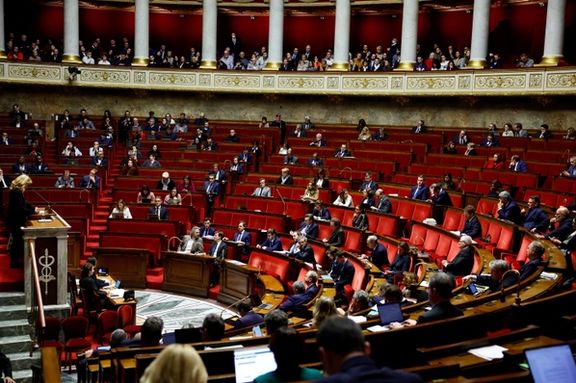
Also on Monday, the French National Assembly unanimously adopted a resolution offering "support for the Iranian people" and condemning the restriction of women's freedoms and rights. This comes ahead of another meeting of EU foreign ministers to discuss new sanctions over the crackdown on protesters.
President Emmanuel Macron's Renaissance party deputy Hadrien Ghomi, himself a descendant of Iranian immigrants, said the 149 votes in favor of the motion in the National Assembly "sent a strong message" to the world. The resolution condemns in the "strongest terms the brutal and widespread repression" against "non-violent demonstrators".
French Foreign Minister Catherine Colonna said that the situation "requires action, with responsibility", adding that after two packages of sanctions already imposed at a European level, new sanctions are being prepared for the next Council of Foreign Ministers on 12 December.
But many Iranians ask if statements and resolutions are enough to pressure the theocratic regime in Tehran. More forceful steps, such as closing all European embassies in Iran or imposing more sanction to directly pressure the ruling elite are possible additional measures people mention in their social media posts.
These all came after the Geneva-based UN Rights Council last week voted to appoint an independent investigation into the Islamic Republic's deadly repression of protests, passing the motion to cheers of activists. Accused Western states of using the council to target Iran in an "appalling and disgraceful" move, Tehran said Monday that it will reject the investigation into the country's repression of antigovernment protests, like it refused to cooperate with UN human rights rapporteurs for 30 years.
Some Iranian officials have started to acknowledge some of its atrocities with Revolutionary Guards general Amirali Hajizadeh saying Tuesday that more than 300 people have been killed in the protests, acknowledging that innocent people have also been killed.
"Everyone in the country has been affected by the death of this lady [Amini]. I don't have the latest figures, but I think we have had perhaps more than 300 martyrs and people killed in this country, including children, since this incident," said Hajizadeh, head of the Guards' aerospace division.